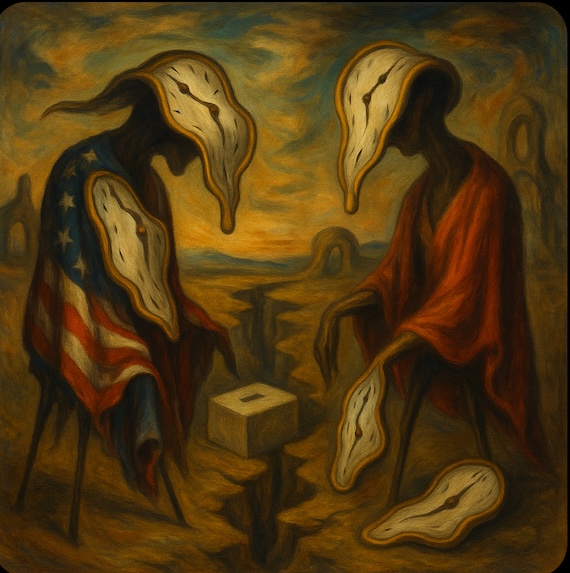Sacramento (Special to Informed Comment; Feature) – The traditional left–right political spectrum no longer captures the forces driving division in America today. That model works when we’re dealing with competing ideologies and when ideological disagreement is the primary driver of division in society. But today, we face something more destabilizing: a profound rupture in shared reality.
Large segments of the population have become so deeply immersed in extreme ideologies that their perception of reality has been reshaped to align with those beliefs. This is not merely a clash of ideas—it’s a clash of worlds. We are not debating different policy views within a common factual framework; we are facing competing realities, where one side’s convictions are increasingly untethered from empirical evidence. This isn’t just polarization—it’s a fragmentation of the truth itself. In this environment, facts are malleable, and conspiracies flourish.
This form of political polarization poses a far greater challenge than conventional ideological conflict. In established democracies, when polarization is ideological, people may disagree deeply yet remain grounded in a shared reality. Ideology then serves a constructive purpose, offering competing visions within a common democratic framework. Opponents become rivals, not enemies, seeking to persuade and win through debate and elections.
But when political identity is rooted in an alternate reality, even a legitimate electoral loss is interpreted as evidence of conspiracy. In such a worldview, opponents are not seen as competitors in a democratic process, but as enemies within posing existential threats who must be defeated and eliminated. The goal is not political persuasion or compromise, but the destruction of the political establishment, and the replacement of ruling elites with a new cadre of loyal, ideologically pure believers. No lesser outcome than victory is seen as valid. Defeat is never accepted—only explained away by invoking a rigged system or a corrupt establishment.

“Polarized,” Digital, ChatGPT, 2025
In this exo-political universe, the establishment is always conspiring, and democracy becomes a performance rather than a process. A clear example of this can be seen in the persistence of conspiracy theories like QAnon or the “Stolen Election” narrative that gained traction after the 2020 U.S. presidential election. Many adherents of these views rejected well-established facts and evidence, instead embracing an alternate reality that portrayed Donald Trump as the rightful winner and the political system as deeply corrupt.
Never miss an issue of Informed Comment: Click here to subscribe to our email newsletter! Social media will pretend let you subscribe but then use algorithms to suppress the postings and show you their ads instead. And please, if you see an essay you like, paste it into an email and share with friends.
The challenge isn’t just ideological; it’s epistemological. We’re not debating over tax rates or healthcare—we’re arguing over what’s real. And navigating this crisis requires more than policy debate or electoral strategy to outvote the extremes. It demands a reckoning with the very nature of truth, legitimacy, and the psychological grip of conspiratorial thinking. It requires rebuilding a shared reality, restoring trust in institutions, and addressing the emotional and psychological forces that make conspiracy theories so appealing. Until we do, we’re not just ideologically divided—we’re unmoored, adrift between the political hemispheres of sanity and insanity.


 © 2026 All Rights Reserved
© 2026 All Rights Reserved